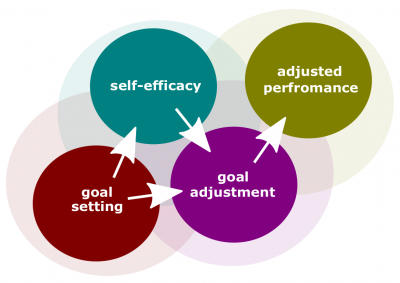Difference between revisions of "Self-efficacy theory"
(Created page with "#*400px|thumb|right|[[Goal-setting theory and self-efficacy]]Self-efficacy theory (hereinafter, the ''Theory'') is a theory that su...") |
(→Related coursework) |
||
| (2 intermediate revisions by the same user not shown) | |||
| Line 1: | Line 1: | ||
| − | + | [[File:Goals-and-efficacy.png|400px|thumb|right|[[Goal-setting theory]] and [[self-efficacy]]]][[Self-efficacy theory]] (hereinafter, the ''Theory'') is a [[theory]] that suggests that an individual's [[self-efficacy]] is based on one or more [[self-efficacy source]]s. | |
| − | ==Related | + | ==Definitions== |
| + | According to [[Organizational Behavior by Robbins and Judge (17th edition)]], | ||
| + | :[[Self-efficacy theory]]. An individual's belief that he or she is capable of performing a task. | ||
| + | |||
| + | ==Related lectures== | ||
*[[Human Motivations Quarter]]. | *[[Human Motivations Quarter]]. | ||
[[Category: Septem Artes Administrativi]][[Category: Articles]] | [[Category: Septem Artes Administrativi]][[Category: Articles]] | ||
Latest revision as of 13:25, 4 January 2019
Self-efficacy theory (hereinafter, the Theory) is a theory that suggests that an individual's self-efficacy is based on one or more self-efficacy sources.
Definitions
According to Organizational Behavior by Robbins and Judge (17th edition),
- Self-efficacy theory. An individual's belief that he or she is capable of performing a task.
